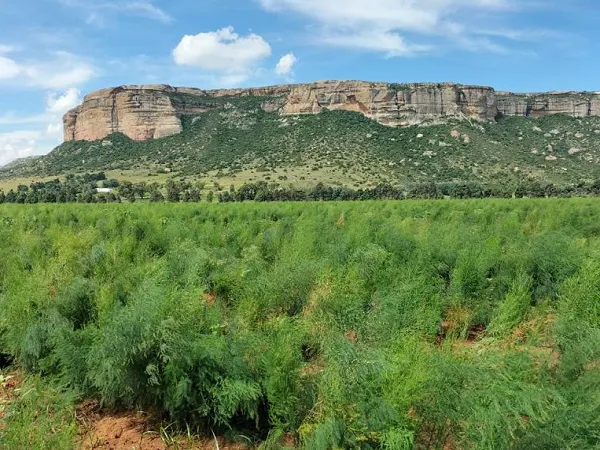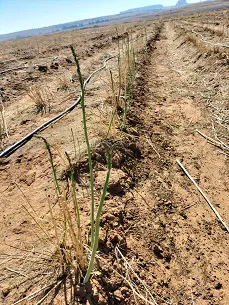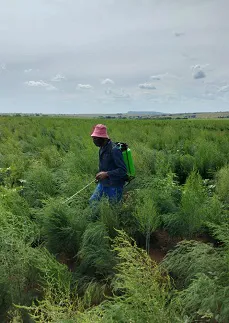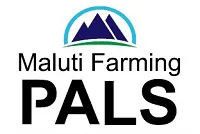Maluti Asparagus Company picks up the slack in South Africa’s production
In South Africa at the moment there is an “extremely minimal” domestic asparagus supply, says Orapeleng Mocumi of Maluti PALS, with only the Maluti Asparagus Company in Roosendal left growing asparagus in the Free State, once the hub of South Africa’s asparagus production.
The first asparagus harvest on David Matobako and Thato Moeng’s farm will be next August but only by the following year when the plantings are four years old will it start realizing the value, he says.
Orapeleng Mocumi is the general manager of the Maluti PALS (Partners in Agri Land Solutions), a private sector-led land reform project following the same model as that of the inaugural PALS in the apple-producing Witzenberg Mountains in the Western Cape.

Re-stabilising retail asparagus supply
Planting asparagus is a signature project for Maluti PALS, an opportunity for a black and white partnership with, he says, an emphasis on sound business and legal principles.
For years Orapeleng saw land reform from the other side, working within the Department of Agriculture, Land Reform and Rural Development (DALRRD) but always, he says, yearning to experience it from the other side.
He explains that David and Thato’s farm is on government lease to them for thirty years. Earlier in his career David was a general worker on a neighbouring farm and upon learning that this farm was being sold to the state, approached DALRRD to buy it through the Pro-Active Land Acquisition Strategy.
 KM Enterprise, representing David Matoboko and Thato Moeng, bring the land and, crucially, the water use licence to the Maluti Asparagus Company of which they are majority shareholders.
KM Enterprise, representing David Matoboko and Thato Moeng, bring the land and, crucially, the water use licence to the Maluti Asparagus Company of which they are majority shareholders.
Right: a first in South Africa – asparagus grown with drip irrigation in the Free State
For the past decade they have been growing maize, sunflower, dry beans and running sheep 30km from Lesotho, but growing asparagus for retail is a whole new endeavour for them.
Forty hectares of asparagus were planted in ridges under irrigation; 20ha under pivot and 20ha under drip irrigation, which has never been done before in South African asparagus growing, Orapeleng says.
“They have had to do a lot of soil correction. Soil runoff has been meticulously planned.”
Their asparagus production will bring stability to asparagus supply to Fresh To Go, retailer Woolworths’ vegetable and salad range supplier. They supplied the right varieties of green asparagus (there is no commercial white asparagus cultivation in South Africa anymore).
The third shareholder in the Maluti Asparagus Company is the neighbouring farmer, Francois Crause, who brings his asparagus-growing experience into the picture.
“The interesting part,” Orapeleng remarks, “is that during asparagus harvesting they cut the stalk down in the morning and by afternoon, it will have grown 25 to 30cm again, and it does the same the next day.”
Asparagus’ inherent hail insurance
 The eastern Free State is mainly a grain-growing area where hail can destroy an entire season’s crop during one sharp hailstorm.
The eastern Free State is mainly a grain-growing area where hail can destroy an entire season’s crop during one sharp hailstorm.
Right: spraying for weeds in between the asparagus ferns
Asparagus’ prodigious growth makes it the perfectly hail-resistant crop and unlike other vegetables, it has a lifespan of more than a decade, more akin to fruit.
Maluti Asparagus Company is currently establishing a Global GAP-certified packhouse on Francois Crause’s farm.
Expanding PALS model
Maluti PALS was established in 2021 when the VKB Group, a diversified agricultural business enterprise, was looking to expand its footprint in the development space. It was initially conceptualized for the eastern Free State, but they are increasingly requested to assist in setting up agricultural transformation projects within the wider province and further afield.
The project model includes compulsory mentorship and management agreements with an exit strategy which is a defining characteristic of PALS projects.
South African PALS has been set up to allow for the creation of more regional PALS initiatives; the latest iteration is Mpumalanga PALS based in Mbombela.
“It is important to note is that the project has been self-financed by the shareholders in the Maluti Asparagus Company, with no outside financing thus far,” he says, noting that financiers traditionally have no reference point from which to consider financing requests for asparagus production.
SA Pals has been approached by Nedbank with whom an MOU regarding agriculture transformation has been signed. The bank is currently considering funding the Maluti Asparagus Company.
“The agricultural sector is so fragmented across racial lines in the eastern Free State, but through this project we are hoping to bring farmers together. To emphasise the areas where farmers can hold hands – it all goes back to food security.”
 For more information:
For more information:
Orapeleng Mocumi
Maluti PALS
Tel: +27 83 777 0951
Email: orapeleng@maluti-pals.co.za
www.sapals.co.za
Publication date:
Author: Carolize Jansen
© FreshPlaza.com